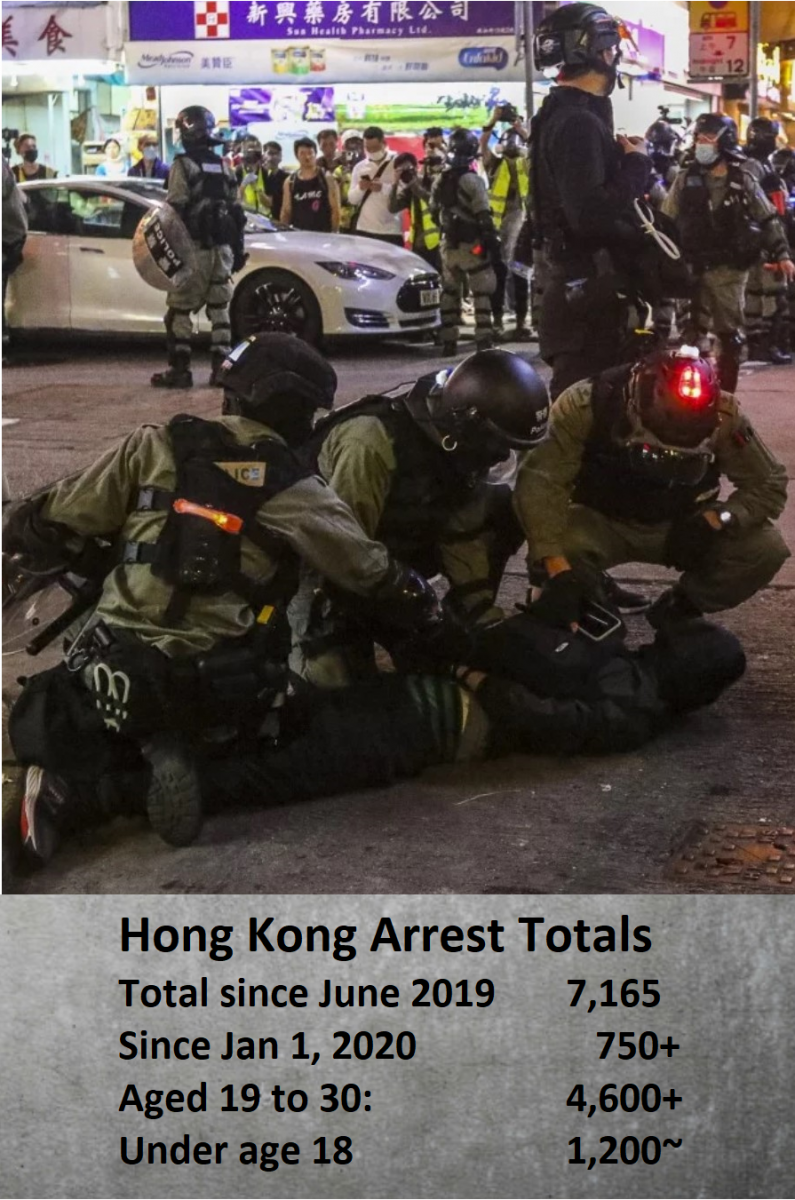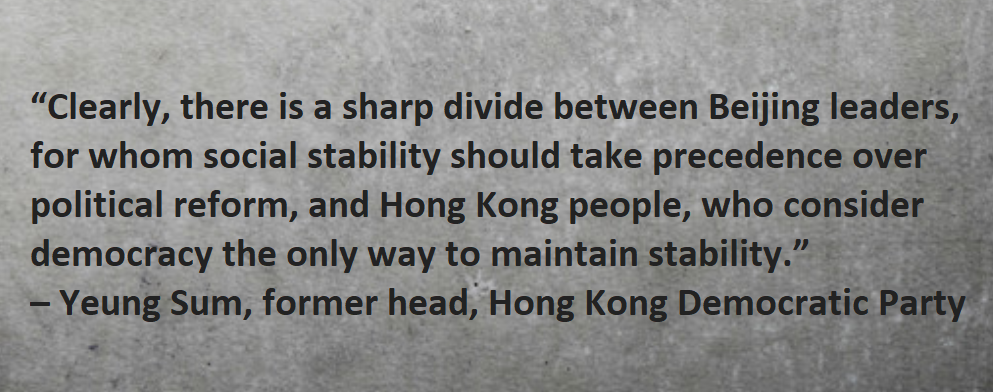Outbreak in Hong Kong: Democracy and COVID-19
Outbreak in Hong Kong: Democracy and COVID-19

HONG KONG: As Hong Kong struggles to cope with the coronavirus outbreak, police sent a warning to protesters by arresting three of the territory’s most prominent democracy advocates.
The February 28 arrests were widely viewed as designed to intimidate the protest movement, which has been largely quiescent since the outbreak began. However, the discontent with the government that triggered protests since June 2019 has only increased with what many view as incompetent management and communications on the new disease. Medical workers in public hospitals staged a brief strike over the government’s refusal to close the border with mainland China in the early days of the outbreak, while demonstrations broke out in several neighborhoods where the authorities announced plans to establish quarantine centers without consulting local residents.

The arrests of the democracy advocates came two weeks after Xia Baolong, a close associate of Chinese leader Xi Jinping with a hardline reputation, was put in charge of Chinese policy in Hong Kong. It’s the latest sign of an increasingly hardline approach to security that could presage tougher action in the months ahead.
Arrested are media tycoon Jimmy Lai; labor activist Lee Cheuk-yan; and Yeung Sum, former head of the Hong Kong Democratic Party. Both Lee and Yeung were long-time members of the Hong Kong legislature. All were charged with participating in an illegal march on August 31 that attracted hundreds of thousands of participants and remained peaceful until clashes later that night between police and a small group of protestors. “These unjustifiable arrests are a shameless attempt to harass and silence those in Hong Kong’s pro-democracy movement,” said Man-Kei Tam, director of Amnesty International’s Hong Kong office. “It continues the pattern of the authorities using politically motivated charges to suppress opposition voices.”
A western diplomat agreed. The arrests are “designed to make anyone else in a similar position think twice” before protesting.
The trend has been evident for some weeks, most notably in how the police carry out mass arrests in response to street protests, irrespective of the size or level of violence. When a small group of protestors tried to vandalize a bank during a generally peaceful rally that attracted hundreds of thousands on New Year’s Day, for example, police blocked roads and rounded up more than 460 people. At a February 29 demonstration of just a few hundred people, 115 arrests were made.
Along with demonstrators, local officials, human rights observers and medics have been among those swept up in this aggressive new strategy.
The tougher posture is part of what analysts describe as increasingly overt moves by Beijing to insert itself into Hong Kong’s response to the protests. “In the communist playbook,” noted one diplomat, “moving aggressively to take over the security services is crucial. Beijing is focused on getting its control of the police further and further into the force’s structure.”
“Communist influence has increased,” observed Steve Vickers, formerly head of criminal intelligence for the Hong Kong police. Even before the political crisis erupted in June 2019, Beijing was bringing Hong Kong police officers to the mainland for regular training with Chinese police, placing particular emphasis on high-tech efforts at social control and the Communist Party’s “philosophy” of policing, designed to underpin party rule.
Once the protests erupted last June, Vickers noted, the Junior Police Officers Association, JPOA, which “has close ties with the central government’s Liaison Office in Hong Kong’s Western district, sought advice” from mainland officials and began to play an increasingly visible role. The JPOA became one of the most vocal voices denouncing the protest movement and also criticized Hong Kong’s Chief Executive Carrie Lam for not cracking down more harshly. Meanwhile, police Commissioner Chris Tang, appointed in November, is widely viewed as pro-Beijing, while Secretary for Security John Lee was described by one diplomat as a “puppet of the mainland.” In addition, many police officers, facing anger and contempt from fellow citizens, have begun spending limited free time across the border in the mainland, often with their families, for a respite from the pressures of crowd control duty. “They feel safe there,” said one analyst about a trend that further pulls the force into Beijing’s orbit.
At the same time, the People’s Armed Police, China’s paramilitary anti-riot and internal security force, at the forefront of campaigns of repression in Xinjiang and Tibet, has also become increasingly visible in Hong Kong. Last summer, Beijing increased the size of the small contingent here, and in recent months, the PAP has done little to hide its presence. At three People’s Liberation Army bases –-Stonecutter’s Island, the Kowloon Tong residential area and an old British army compound called the Gun Club near densely populated Tsim Sha Sui – the PAP has held training exercises easily observable by the general public. Eyewitnesses report that the exercises, conducted in full uniform, focused on crowd control, including the use of plastic handcuffs to bind the hands of “demonstrators.”
At the same time, according to a diplomatic source, PAP officers are now regular visitors to the Operations Wing of police headquarters in Wan Chai, the force’s nerve center. That branch has long handled Hong Kong police liaison with external police and military forces, including the People’s Liberation Army garrison. In recent months, this role has reportedly expanded to include interaction with the People’s Armed Police. Under the circumstances, it would be reasonable to assume discussions include developing plans for a coordinated response if Hong Kong’s unrest continues.
These developments have fueled speculation that, for all practical purposes, China has marginalized Hong Kong’s chief executive. Carrie Lam is already hugely unpopular, with public approval ratings now in the single digits. Late last year, diplomats say she privately told a group of lawyers that a hardline “law and order faction” in the government and security services taking cues from Beijing was calling the shots, implying that her authority had been deeply eroded. A few weeks before, she was heard in a leaked audio recording as saying she would quit if she had a choice, but authorities in Beijing were preventing this step. As ex-Hong Kong police officer Vickers has noted, “the old Hong Kong is gone. Carrie Lam runs the mayor’s office [a largely powerless position in China.] The party secretary is in Western [where the Liaison Office is situated].”

While the protests have largely subsided due to the coronavirus outbreak, many observers anticipate they will resume later this spring, assuming the disease subsides by then, as was the case with the 2003 SARS epidemic. Most key issues that triggered last year’s confrontation, especially complaints about police behavior and the lack of progress towards more representative government, remain unresolved. Public fury at the government’s inept handling of COVID-19, expressed by people on both sides of the political divide, may add fuel, as will the arrests of prominent figures in the democracy movement such as Lai, Lee and Yeung.
Several emotion-laden dates are approaching – the annual commemoration of the 1989 Tiananmen Square crackdown on June 4; followed by the first anniversaries of several key episodes from last summer, including two marches that each attracted more than a million people; the occupation of the Legislative Council; and a bloody Triad attack on protestors at a subway station.
If angry Hong Kongers again take to the streets, they will confront a security force even more aggressive under Beijing’s thumb than a year ago. It is a highly combustible mixture, which means Hong Kong could be in for a long and bitter summer.
Mike Chinoy was a long-time CNN foreign correspondent, serving as Beijing bureau chef and senior Asia correspondent. He is currently a non-resident senior fellow at the University of Southern California’s US-China Institute. His new book is Are You With Me? Kevin Boyle and the Rise of the Human Movement. Free worldwide shipping is available.